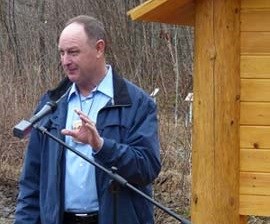THUNDER BAY – The Ontario government is considering a repeal of the controversial Far North Act.
Legislated by the Liberals in 2010, Minister of Natural Resources and Forestry John Yakabuski on Monday announced the Conservative government has been reviewing the Act with the goal of reducing red tape and restrictions on development projects in the region, including the Ring of Fire, all-season roads and electrical transmission projects in remote communities.
“We have heard time and again that the Act limits development in the Far North of Ontario, where there is so much potential for economic growth and prosperity," Yakabuski said in a release issued by the province.
"That's why we are moving quickly with the intention of building a path forward that supports business certainty while continuing to work closely with First Nations communities at an advanced stage of planning."
The government plans to seek input on a proposal to repeal the Far North Act and amend the Public Lands Act.
The move was welcomed by Nishnawbe Aski Nation leadership.
“We strongly oppose the Far North Act and are encouraged that Ontario is taking a second look at this controversial legislation. The Act was enacted without meaningful consultation to legislate our territory under the control of the province and threatens the inherent, Treaty and Aboriginal rights of our people. Ontario does not have free reign to do as it pleases in the Far North, and we will defend our right to control development so that the wealth from our lands benefits our people and the growth of our Nation," said NAN Grand Chief Alvin Fiddler in a release issued late Monday afternoon.
"We welcome the opportunity to engage with the province, but any process must begin with government-to-government dialogue in our traditional territories. We are prepared to facilitate a consultative process for the development of the lands and resources in NAN territory. In the meantime, First Nations engaged land-use planning under the Far North Act must have access to alternate sources of resources to continue this work.”
Fiddler went on to say the repeal would not mean uncontrolled development in Ontario's north, but instead a blanced and shared development under treaties that require First Nations consent under the United Nations Declaration on the Rights of Indigenous people. Fiddler said NAN viewed the Far North Act as invalid law and a new form of colonialism
The proposal has been posted to the Environmental Registry for a 45-day consultation period and Indigenous communities and groups, businesses and other stakeholders are invited to have their say on the repeal plan.
If the repeal is successful, the government has promised to continue joint planning with Marten Falls, Webequie, Eabametoong, Mishkeegogamang, Constance Lake, Deer Lake and McDowell First Nations, who have already publicly shared information about proposed land uses. However, the province has set a Dec. 31, 2020 deadline to complete the process and have the plans approved.
Any future land planning beyond that would be subject to the amended Public Lands Act and based on both First Nations’ interests and government resources and priorities.
Invitations to First Nations communities to a trio of engagement sessions will be issued. The sessions will be held in Timmins on March 7 and Thunder Bay on March 19 and March 20.
